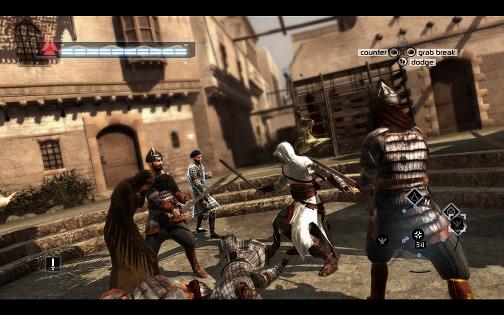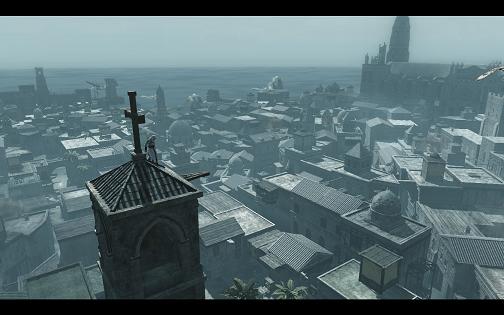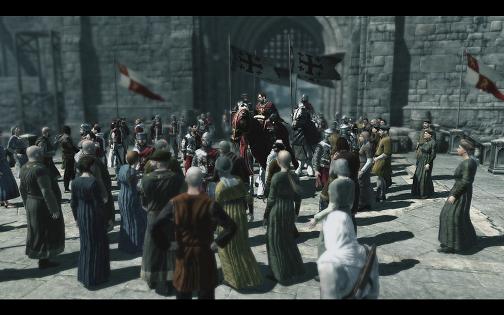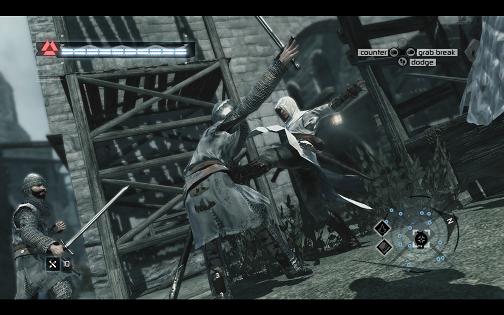
For a game that got into the news so often for all the wrong reasons, beginning with the torrid Jade Raymond affair, to complaints about the unfamiliar controls to the early leak of the PC version and Ubisoft’s subsequent decision to sue the source of the leak for a ridiculous sum of damages, Assassin’s Creed turned out for me to a surprisingly good game. After all, the basic premise of the game sounds fantastic: play as a member of the Hashahin, the original brotherhood of assassins from which the English word “assassin” is itself derived, in the sand-box environment of the Holy Land while the Crusades are raging. There is plenty to be impressed with by this game, so it’s all the more disappointing that it gets so many basic elements so wrong.
First the good stuff. Most of the player’s time is spent controlling Altair, who starts out as an accomplished but somewhat cocky member of the brotherhood. The brotherhood’s aim, as stated by its leader Al Mualim, is to achieve peace in the Holy Land, and as such Altair is sent to assassinate critical targets from both sides of the war, Saracen and Crusader, in order to put an end to the fighting. And I’m not joking when I say that Altair is an accomplished assassin. He can navigate the environment so well, leaping from rooftop to rooftop, clambering up walls and barrelling through crowds that he’d put Lara Croft to shame. He can walk up to a target and effortlessly kill someone so quietly with a hidden blade that someone standing ten paces away won’t even notice. All of these feats are easy to accomplish with the controls, even if they are a bit esoteric and take some effort to learn. Some critics have complained that the near-automatic execution of the parkour-style moves, since Altair will always perform the move most appropriate to the context and the environment, sacrifices actual gameplay for cool visuals. I heartily applaud it however. If I’m supposed to be controlling a skilled assassin, I don’t want to fight the controls to do the cool moves, I want to just be able to tell Altair what I want to do, and he’ll do it.

The assassination missions take place in three major cities, Damascus, Jerusalem and Acre, and the stronghold of the brotherhood, Masyaf. All four areas are connected through a zone called the kingdom through which Altair can travel on horseback. The single most impressive thing about Assassin’s Creed is how amazing each of the major cities looks and feels. They’re huge sprawls of houses, markets, palaces, minarets, mosques and other buildings and when you arrive at a city and look down on its vastness and realize that every single point in it is reachable and climable, that’s really an experience that will take your breath away. Then when you’re actually manage to sneak into the city, prepare to be blown away again because unlike the empty and lifeless rooms that some games try to pass off as cities (I’m looking at you Mass Effect), the streets in Assassin’s Creed are teeming with life. You’ll see shoppers browsing and bickering with shopkeepers, labourers glumly toting their loads, drunks and beggars harrassing passers-by and clumps of people gathered at street corners to listen to the news crier. It’s a good thing that the developers saw fit to provide you with a special command just to let you gently push your way past the crowds.
That command isn’t just there as a convenience either. If you try to elbow your way through a crowd, or heaven forbid, accidentally bump into a water carrier or a porter and cause them to drop whatever it is they’re carrying, you’ll quickly attract the attention of the omnipresent guards who will eventually become suspicious enough to attack you. So most of the time, you’ll likely want to operate in what the game calls “low profile” mode, during which you act and walk more or less like everyone else. When you’re around extra alert guards, you might even want to “blend” in with the crowd, which causes Altair to clasp his hands together as if in prayer and keep his eyes humbly fixed on the ground. This move oddly makes Altair all but invisible to the guards but is incredibly aggravating to use for extended periods of time because it also causes him to slow down to a snail’s pace. When you do get found out, you can abandon all pretence and switch to “high profile” mode, which allows Altair to do all the cool parkour-style moves to escape the guards or dispatch them all in combat.

Assassin’s Creed managed to become known as a stealth game, and even its Wikipedia entry, calls it a “third-person stealth game”, but if you’re looking for an experience like Thief or Splinter Cell, you’ll just end up being confused and disappointed. The only stealth element is the aforementioned “social stealth” to avoid notice and escape pursuit as well as Altair’s ability to surreptitiously assassinate targets with a hidden blade, but don’t expect the sneaking and hiding of more traditional stealth games. One tell-tale sign is Altair’s amazing combat ability. If Garrett or Sam Fisher tried to engage more than one or two enemies at a time, they’d likely get their asses handed to them. Altair on the other hand can not only carve a bloody path through what feels like an entire army, leaving a pile of horrifically mangled bodies in his wake, you’re very much required to do so to complete the game. As befits an action game, the combat sequences in this game are fantastic and I guarantee that the absolutely brutal finishing moves Altair can do will make your jaw drop. Altair is animated so fluidly that it feels like he’s flitting and dancing from enemy to enemy, dealing death with every stroke.
Apart from the actual assassinations, Altair also has to perform investigative missions of various types, which include eavesdropping on conversations, pickpocketing letters, beating up people for information and timed parkour runs through the city. You are typically required to do one or more of these investigations before being allowed to perform the associated assassinated, and while doing more than the required number is supposed to confer an advantage due to better information, I’ve found that it makes no real difference. You can also climb up to to various types of vantage point to unlock key locations on your map and rescue citizens being harassed by guards. This unlocks things like wandering groups of scholars who act like a moving hiding spot and vigilantes who will help you out by annoying and detaining guards chasing you.

Now comes the bad news. As impressive and alive as the cities in Assassin’s Creed look, after the first 30 minutes or so of exploring one of them, there’s a boring sameyness to them, making you feel like you’re in a timeless, minimally interactive virtual tour of a historical city instead of a game. For example, there’s no day/night cycle in the game, so everything’s always the same all the time. Compare that to the cities of Grand Theft Auto, where the day/night cycle not only affects how the city looks but also what types of people are out and about in the city. In the same way, nothing exciting ever happens in Assassin’s Creed unless you’re the one doing it. In the GTA games, you might be merrily minding your own business when a car crashes into the car, prompting the wronged party to pull out guns and start shooting, which in turn gets the police involved, while you, as the player, watch from the sidelines. It would have added a bit of zest to the game if you’re strolling down a street in Damascus when a thief randomly crashes into you with the guards hot on his heels.
The same sense of sameyness also pervades the missions in the game. Doing each of the different side missions feels interesting at first, but after a while you realize that all of them are essentially cut from the same template. Play one pickpocketing mission and you know exactly how all of the others work. If you don’t like the gameplay from the beginning, then don’t expect the game to grow on it because you’ll basically be doing the same things over and over again. Finally, the plot of the game is fairly pedestrian and predictable with a science-fiction wrapper around the main events that adds nothing to game except to pave the way for a sequel.
It’s hard to say too many bad things about Assassin’s Creed because I really liked the game, warts and all, but it’s a good example of that even a very impressive engine coupled with fantastic visuals and animation won’t add up to a great game if the gameplay and story aren’t there. The best thing to say about it is that going forward, I’m very excited to know what else Ubisoft has in store for this technology.
2 thoughts on “A Game: Assassin’s Creed (PC)”